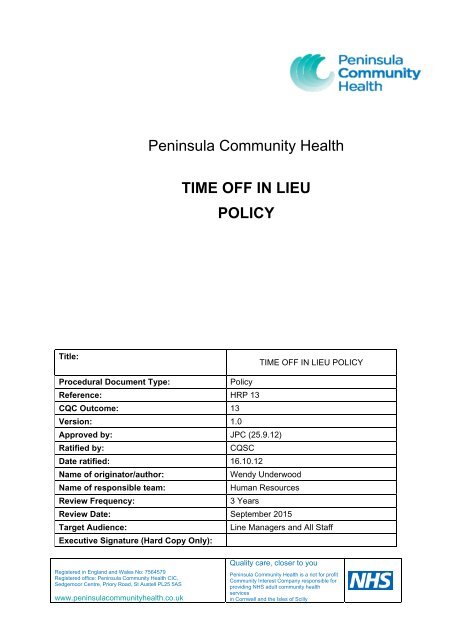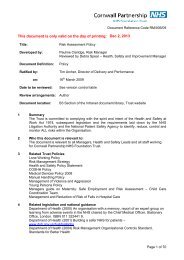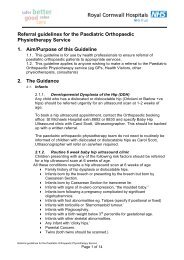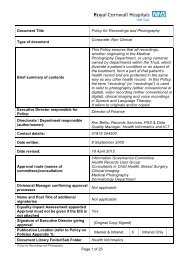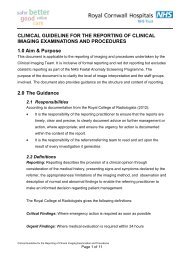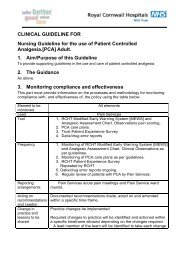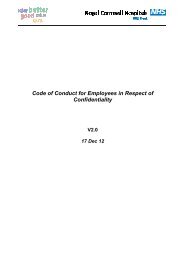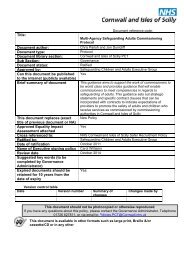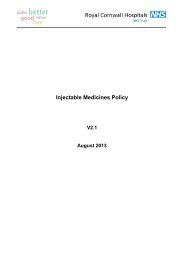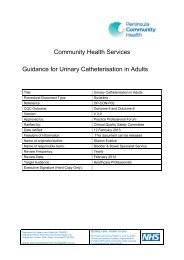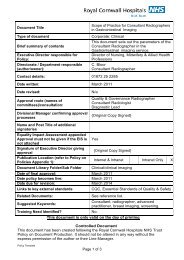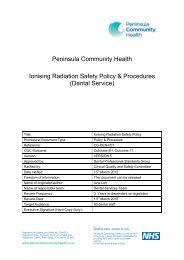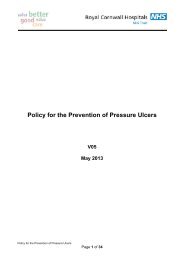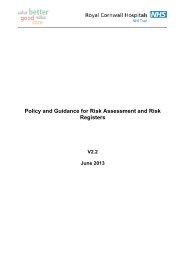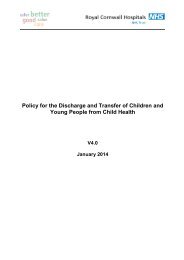Create successful ePaper yourself
Turn your PDF publications into a flip-book with our unique Google optimized e-Paper software.
Peninsula Community HealthTIME OFF IN LIEUPOLICYTitle:TIME OFF IN LIEU POLICYProcedural Document Type:<strong>Policy</strong>Reference: HRP 13CQC Outcome: 13Version: 1.0Approved by: JPC (25.9.12)Ratified by:CQSCDate ratified: 16.10.12Name of originator/author:Wendy UnderwoodName of responsible team:Human ResourcesReview Frequency:3 YearsReview Date: September 2015Target Audience:Line Managers and All StaffExecutive Signature (Hard Copy Only):Registered in England and Wales No: 7564579Registered office: Peninsula Community Health CIC,Sedgemoor Centre, Priory Road, St Austell PL25 5ASwww.peninsulacommunityhealth.co.ukQuality care, closer to youPeninsula Community Health is a not for profitCommunity <strong>In</strong>terest Company responsible forproviding NHS adult community healthservicesin Cornwall and the Isles of Scilly
Contents1 <strong>In</strong>troduction 22 Definitions 23 Duties 23.1 The Organisation 24 <strong>Time</strong> <strong>Off</strong> in <strong>Lieu</strong> <strong>Policy</strong> (TOIL) 24.1 The Process 24.2 Overtime Payments and TOIL 24.3 Accrual of TOIL 34.4 Working <strong>Time</strong> Regulations 34.5 Taking Back Toil 34.6 TOIL for Training/Study Days 44.7 TOIL for Travel <strong>Time</strong> 44.8 Exceptions for Claiming TOIL for Travel <strong>Time</strong> 44.9 Recording of TOIL 44.10 Authorisation of TOIL 44.11 Restrictions of TOIL 44.12 Monitoring of TOIL 55 Risk Management Strategy Implementation 55.1 Implementation 55.2 Training and Support 55.3 Dissemination 55.4 Storing the Procedural Document 55.5 Equality Impact Assessment 56 Process for Monitoring Effective Implementation 57 Associated Documentation 68 References 6APPENDICESA TOIL Claim Form 7B Equality Impact Assessment 8
1. <strong>In</strong>troduction1.1 Peninsula Community Health (PCH) recognises that on occasion employees may be askedto work over their contracted hours, due to the needs of the service.1.2 The purpose of this policy is to provide guidance on the process for managing unpaidperiods of time that staff have worked which are in addition to their normal contracted hours.1.3 The policy applies to all staff that are employed by PCH. It does not apply to ContingentWorkforce, Bank Workers, Students or Volunteers.2. Definitions2.1 <strong>Time</strong> off in <strong>Lieu</strong> (TOIL) is re-claiming time owed for additional time that has been workedover the employee’s contracted hours instead of paying the employee for the additionaltime.3. Duties3.1 OrganisationPCH will ensure:the provisions of this policy and procedure are conducted fairly and reasonably;all employees are informed about and have access to the contents of this policy andprocedure.4. <strong>Time</strong> <strong>Off</strong> in <strong>Lieu</strong> <strong>Policy</strong>4.1 The Process4.1.1 TOIL is built up by working over the normal contractual hours.4.1.2 Where possible, managers and employees should agree the need for the additional time tobe worked prior to work completed. Managers must also agree when the time can be takenback which is mutually convenient for the service and the employee.4.2 Overtime Payments and TOIL4.2.1 Employees in Bands 1-7 have a contractual right to be paid at the appropriate overtime ratefor approved additional hours worked in excess of the standard full time hours of 37.5 hoursper week. Part time employees will receive payment for additional hours worked at plaintime rates until their hours exceed the standard full time hours unless they take TOIL.4.2.2 Under the national agreement, set out in the Agenda for Change Handbook, employeesmay request to take time off in lieu as an alternative to receiving overtime payments. <strong>Time</strong>off in lieu of overtime will be paid at plain time rates. However, where, for operationalreasons, staff are unable to take the time off in lieu within three months (of the overtimebeing worked) they must receive the overtime payment, unless there are exceptionalcircumstances (see section 4.2.1 above). Separate terms and conditions apply for Doctorsand Dentists.2
4.2.3 Senior staff in Bands 8 and 9 are not entitled to overtime payments but may accrue TOIL ifon a formal oncall rota.4.3 Accrual of TOIL4.3.1 Wherever possible, Managers and employees must agree additional hours before they areaccrued.4.3.2 Where it is not possible to agree the additional hours beforehand, the manager must beinformed as soon as practicable and the manager must sign the TOIL claim form.4.3.3 The accrual of TOIL should not normally exceed a maximum of 15 hours per calendarmonth. Where there are exceptional circumstances that require TOIL to be accrued over 15hours, the reasons must be clearly stated on the TOIL claim form (Appendix A)4.3.4 The minimum amount of time that can be recorded for the purpose of TOIL is a block of 15minutes, eg. if it is agreed that an employee starts work 15 minutes before their contractedstart time, this 15 minutes can be recorded as accrued TOIL. However, employees whostart 5 minutes early and finish 10 minutes later than their usual contractual hours will not beable to accrue TOIL as this is not a block of 15 minutes.4.3.5 TOIL will be rounded down to the nearest 15 minutes. E.g if an employee works 20 minutesover their normal hours, they can claim 15 minutes TOIL. If an employee works 25 minutesover their normal hours, they may accrue 15 minutes. If an employee works 35 minutesover their normal hours, 30 minutes can be claimed.4.4 Working <strong>Time</strong> Regulations4.4.1 Employees are legally entitled, under the Working <strong>Time</strong> Regulations (1998) to take aminimum of a 20 minute unpaid break if working 6 hours or more. <strong>In</strong> the interests ofemployee wellbeing and patient safety, PCH requires employees to observe this break,which is not counted as working time.4.5 Taking back TOIL4.5.1 <strong>Time</strong> accrued over normal working hours should be taken back as soon as practicable afteraccrual.4.5.2 No entitlement can be carried forward without prior agreement. Any entitlement nottaken will be paid as overtime at the appropriate rate.4.5.3 TOIL must be claimed within 3 months of accrual. Should this not be practicable due toorganisational reasons, employees will be paid at plain time rates, if the amount to be paidmeans the employee does not exceed 37.5 hours a week in total. <strong>In</strong> cases where the TOILaccrued means that the employee would have exceeded 37.5 hours, payment will be at timeand a half and must be claimed on an extra duty claim form if it is not possible for it to betaken back as TOIL.4.5.4 Managers should review all requests for TOIL to ensure that service needs are met and thatemployees are treated equitably and fairly.3
4.6 TOIL for Training / Study Days4.6.1 Where applicable, if an employee is required to attend a training activity which is held on aday(s) that is not normally worked by the employee, paid time off in lieu may be approvedby the Line Manager.4.6.2 Any time off in lieu that has been accrued due to a training activity must be agreed with theLine Manager before it is taken and taken within three months of accruing it.4.6.3 TOIL that is taken by the employee but which has not been approved will be treated asunauthorised absence.4.7 TOIL for travel time4.7.1 TOIL is not accrued for travel time to or from work or training courses, regardless of whetherthe work base is temporary or permanent.4.7.2 However, employees can claim for the appropriate mileage for any travel that is further thantheir normal home to base mileage. E.g. if an employee is required to attend a meeting /training session at 9 am at a venue that is not at their usual work base, which takes 45minutes to get to, employees can claim the appropriate mileage but not the time it takes toget to the meeting / training session.4.8 Exceptions for claiming TOIL for Travel <strong>Time</strong>4.8.1 Employees may only claim TOIL for travel time if they are rostered to work on a formal OnCall rota and they are called out to work as part of their duties. This should be recorded onthe TOIL form and the manager should be notified of TOIL accrued.4.8.2 <strong>Time</strong> spent being On Call without being called out does not accrue TOIL.4.9 Recording of TOIL4.9.1 Employees must record the TOIL accrued and taken on the TOIL claim form (Appendix A)and this must be agreed and signed by the Line Manager or Head of Department4.11 Authorisation of TOIL4.10.1 Employees can request when they prefer to take TOIL and this should be agreed with theLine Manager prior to the date requested, using the form in Appendix A to authorise.4.10.2 There may be times where managers have previously authorised TOIL but due to the needsof the service, they may have no option but to request that the employee takes TOIL back atanother mutually convenient time. The line manager will amend the authorisation formaccordingly.4.10.3 It is not acceptable to work overtime in order to accrue TOIL to attend a special occasion.Annual leave should be used for this purpose.4.11 Restrictions of TOIL4.11.1 A maximum of 15 hours TOIL can be accrued within 1 month unless there is an exceptionalservice need and the TOIL this should be taken within 3 months of accrual.4
4.11.2 <strong>In</strong> the event that employees are not able to take this time back as TOIL within the set timeframe, managers can either:Pay the employee for time accrued at the appropriate rate.Exceptionally agree an extension of time in order to take this accrued TOIL,which should not exceed 1 further month4.12 Monitoring of TOIL4.12.1 All TOIL should be recorded and approved on the TOIL claim form (Appendix A) andmonitored by the Line Manager/Head of Department.4.12.2 Any suspected abuse of TOIL may be treated as fraud and may be investigated under theOrganisation’s Disciplinary <strong>Policy</strong> and Procedure.5. Risk Management Strategy Implementation5.1 ImplementationAll staff to be made aware of the new policy via PCH’s communication bulletins and HRteam and Locality Managers to promote policy and process through team meetings.5.2 Training and SupportTraining for all managers and supervisors on how to apply the policy consistently and fairly,delivered by the HR Team in conjunction with the Training Department5.3 DisseminationOnce ratified, this policy will be loaded to the intranet (read only) as a new policy andlabelled HRP18.Confirmation of receipt is not required for this procedural document.5.4 Storing the Procedural DocumentThe signed procedural document will bje stored (hard copy) centrally, as will the digital (softcopy) version.5.5 Equality Impact AssessmentPeninsula Community Health aims to design and implement services, policies andmeasures that meet the diverse needs of our service, population and workforce, ensuringthat none are placed at a disadvantage over others.As part of its development, this strategy and its impact on equality have been assessed.The assessment is to minimise and if possible remove any disproportionate impact onemployees on the grounds of race sex, disability, age, sexual orientation or religious belief.No detriment was identified.6. Process for Monitoring Effective ImplementationThe effective implementation of this policy will be monitored by the Workforce Directorate inconjunction with the Joint Partnership Committee (JPC). Any changes in employmentlegislation which impact on the policy will be updated by the HR Team and the JPC will beinformed. The <strong>Time</strong> <strong>Off</strong> <strong>In</strong> <strong>Lieu</strong> <strong>Policy</strong> will be reviewed every 3 years from the date ofratification.5
7. Associated DocumentationThis document references the following supporting documents which should be referred toin conjunction with the document being developed:Travel Claim Management GuidelinesDisciplinary <strong>Policy</strong> and ProcedureFlexible Working <strong>Policy</strong>Discretionary Leave <strong>Policy</strong>Excess Mileage Management GuidelinesStudy Leave <strong>Policy</strong>8. ReferencesBusiness Link websitehttp://www.businesslink.gov.uk/bdotg/action/detail?itemId=1074415793&type=RESOURCEWorking <strong>Time</strong> RegulationsAgenda for Change Handbook6
Appendix A<strong>Time</strong> <strong>Off</strong> <strong>In</strong> <strong>Lieu</strong> Claim FormName: ………………………………. Designation:…………………………………………Directorate…………………………… Contracted hours per week: ……………Date extra hoursworked/ takenbackHours worked/takenTotal hours Purpose Authorised( Manager)Datee.g. 1/6/12 30 mins worked 30 mins Extra workload Line Manager 1/6/12e.g. 1/7/12 15 mins taken 15 mins taken <strong>Time</strong> back Line Manager 1/7/1215 mins owedPlease note:“Extra hours” means time worked in addition to a person’s contracted hours, at the request of amanager for a specific purpose.A minimum claim is 15 MinutesEach entry must be authorised by the Manager or the Manager who requested the extra hoursto be workedTOIL should be taken within 3 months of accruing it and preferably within the financial year.TOIL should be claimed back as soon as practicableThe application of TOIL is discretionary and the Manager will make the final decision.This form should be kept with your annual leave card.7
APPENDIX BEquality Impact Assessment Proforma <strong>In</strong>itial ScreeningSection HR <strong>Off</strong>icer responsible for the assessment Wendy Underwood, HR AdvisorName of <strong>Policy</strong> to beassessed<strong>Time</strong> <strong>Off</strong> <strong>In</strong> <strong>Lieu</strong> <strong>Policy</strong>Date ofAssessment6/7/12 Is this a new or existingpolicy?New1. Briefly describe the aims, objectives andpurpose of the policy.2. Are there any associated objectives of thepolicy? Please explain.3. Who is intended to benefit from this policy, andin what way?The purpose of this policy is to provide a fair and equitable approach to the accrual andtaking back time owed.To contribute to the most efficient and effective use of resources in the organisation.The policy provides clarity for Line Managers and in respect of TOIL accrued and how this can beclaimed.4. What outcomes are wanted from this policy? For all employees to have a clear understanding of their entitlement to claim TOIL back.5. What factors/forces could contribute/detractfrom the outcomes?Communication issues; the degree of awareness by employees and line managers of theappropriate obligations.Staff not complying with the rules when accruing and taking back TOIL.Staff not taking their TOIL entitlement within the timeframe.6. Who are the mainstakeholders in relation to thepolicy?Managers, employees and Trade Unionrepresentatives7. Who implements the policy, andwho is responsible for the policy?Employees and linemanagers in association withthe HR Team8. Are there concerns that the policy could have adifferential impact on RACIAL groups?What existing evidence (either presumed orotherwise) do you have for this?NPlease explainAn objective of this policy is to ensure that the organisation adopts a clear and consistentapproach to the entitlement and approval of TOIL, including individuals covered by protectedcharacteristics as defined in the Equality Act 2010. The organisation respects employees fromall ethnic and racial backgrounds as evidenced in its Equality, Diversity and Human Rights<strong>Policy</strong>.8
9. Are there concerns that the policy could have adifferential impact due to GENDER (includingTRANSGENDER)?NWhat existing evidence (either presumed orotherwise) do you have for this?10. Are there concerns that the policy could have adifferential impact due to DISABILITY?An objective of this policy is to ensure that all employees who accrue TOIL are treatedconsistently and fairly regardless of the characteristics of the staff member concerned. Theorganisation has a commitment to ensure that no person is discriminated against on the groundsof their gender or transgender status.NWhat existing evidence (either presumed orotherwise) do you have for this?11. Are there concerns that the policy could have adifferential impact due to SEXUALORIENTATION?What existing evidence (either presumed orotherwise) do you have for this?12. Are there concerns that the policy could have adifferential impact due to their AGE?An objective of this policy is to ensure that all employees who accrue TOIL are treatedconsistently and fairly regardless of the characteristics of the staff member concerned. Theorganisation has a commitment to ensure that no person is discriminated against on the groundsof their disability.NAn objective of this policy is to ensure that all employees who accrue TOIL are treatedconsistently and fairly regardless of the characteristics of the staff member concerned. Theorganisation has a commitment to ensure that no person is discriminated against on the groundsof their sexual orientation.NWhat existing evidence (either presumed orotherwise) do you have for this?An objective of this policy is to ensure that all employees who accrue TOIL are treatedconsistently and fairly regardless of the characteristics of the staff member concerned. Theorganisation has a commitment to ensure that no person is discriminated against on the groundsof their age.9
13. Are there concerns that the policy could have adifferential impact due to their RELIGIOUSBELIEF?NWhat existing evidence (either presumed orotherwise) do you have for this?14 Are there concerns that the policy could have adifferential impact due to their MARRIAGE ORCIVIL PARTNERSHIP STATUS? (This MUST beconsidered for employment policies).What existing evidence (either presumed orotherwise) do you have for this?15 Are there concerns that the policy could have adifferential impact due to GENDERREASSIGNMENT OR TRANSGENDER ISSUES?An objective of this policy is to ensure that all employees who accrue TOIL are treatedconsistently and fairly regardless of the characteristics of the staff member concerned. Theorganisation has a commitment to ensure that no person is discriminated against on the groundsof their religious belief.NAn objective of this policy is to ensure that all employees who accrue TOIL are treatedconsistently and fairly regardless of the characteristics of the staff member concerned. Theorganisation has a commitment to ensure that no person is discriminated against on the groundsof their marriage or civil partnership status.NWhat existing evidence (either presumed orotherwise) do you have for this?16 Are there concerns that the policy could have adifferential impact due to PREGNANCY ORMATERNITY?An objective of this policy is to ensure that all employees who accrue TOIL are treatedconsistently and fairly regardless of the characteristics of the staff member concerned. TheOrganisation has a commitment to ensure that no person is discriminated against on thegrounds of their reassignment or transgender status.NWhat existing evidence (either presumed orotherwise) do you have for this?An objective of this policy is to ensure that all employees who accrue TOIL are treatedconsistently and fairly regardless of the characteristics of the staff member concerned. TheOrganisation has a commitment to ensure that no person is discriminated against on thegrounds of their pregnancy or maternity status.10
17 How have the Core Human Rights Values of:Fairness;Respect;Equality;Dignity;AutonomyBeen considered in the formulation of thispolicy/strategyIf they haven’t please reconsider the documentand amend to incorporate these values.18. Which of the Human Rights Articles does thisdocument impact?What existing evidence (either presumed orotherwise) do you have for this?The Core Human Rights Values underpin this policy, which has been formulated with theseunderlying principles in mind and in line with the Organisation’s commitment to equality, diversityand human rights as set out in its Equality and Diversity <strong>Policy</strong> and the Equality, Diversityand Human Rights Scheme 2009-2012.All staff members that accrue TOIL will have their individual needs taken into accountand will be treated with dignity and respect.The right:Yes No To life;X Not to be tortured or treated in an inhuman or degrading way;X To be free from slavery or forced labour;X To liberty and security;X To a fair trial;X To no punishment without law;X To respect for home and family life, home and correspondence;X To freedom of thought, conscience and religion;X To freedom of expression;X To freedom of assembly and association;X To marry and found a family;X Not to be discriminated against in relation to the enjoyment of any ofXthe rights contained in the European Convention;XX To peaceful enjoyment of possessions and education;X To free electionsXThe policy is underpinned by a commitment to protect the rights of individuals in respect oftreating staff fairly and equitably in the accrual and taking back TOIL.How will you ensure that those responsible forimplementing the <strong>Policy</strong> are aware of the HumanRights implications and equipped to deal withthem?Through management updates via the staff intranet and guidance/best practice informationfrom HR11
19. Could the differential impactidentified in 8 – 13 amount tothere being the potential foradverse impact in this policy? NPlease explain20. Can this adverse impact bejustified on the grounds ofpromoting equality of opportunityfor one group? Or any otherreason?NPlease explain for each equality heading (questions 8 –13) on a separate piece of paper.18. Should the policy proceed toa full equality impactassessment? N17. If Yes, describe why, then proceed to a full EIA.18. If No, are there any minor further amendments that should take place?19. If a need for minor amendments is identified, what date were these completed and whatactions were undertaken.Signed (completing officer) …Wendy Underwood………………….. Date 6.07.12Signed (Head of Section) ……………………………………………………….. DatePlease ensure that a signed copy of this form is sent to both the Policies <strong>Off</strong>icer and the Equality and Diversity lead to be placed on the PCH website.12


